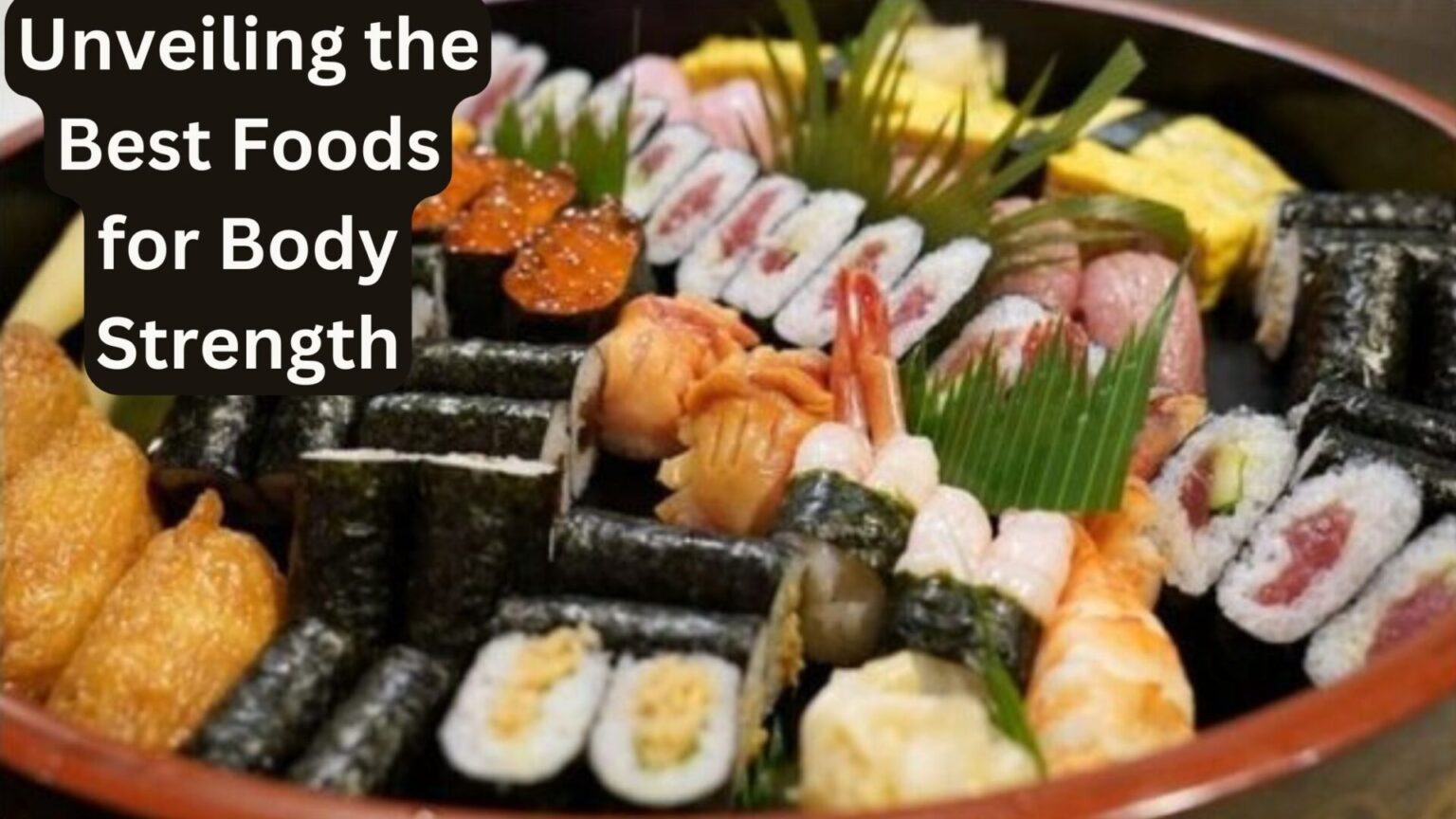Introduction:
Nutrient-Rich Warriors: Unveiling the Best Foods for Body Strength

In the quest for a strong and resilient body, the role of nutrition cannot be overstated. The foods we consume play a crucial role in fueling our bodies and providing the essential nutrients needed for strength and vitality. This article serves as your guide to unlocking the potential of nutrient-rich warriors that empower your body with the strength it deserves.
The Best Foods for Body Strength
- Lean Proteins – The Foundation of Strength: The cornerstone of a strong body lies in lean proteins. Foods such as chicken, fish, tofu, and legumes are rich in essential amino acids, promoting muscle growth and repair. Make them a staple in your diet to fortify your strength.
- Power-Packed Whole Grains: Whole grains like quinoa, brown rice, and oats are loaded with complex carbohydrates, fiber, and essential nutrients. They provide a sustained energy release, supporting your body through intense workouts and daily activities.
- Green Leafy Vegetables – Nature’s Strength Elixir: Spinach, kale, and broccoli are nutrient powerhouses, offering vitamins, minerals, and antioxidants. These greens contribute to overall health, supporting your body’s strength and resilience.
- Healthy Fats for Energy and Vitality: Incorporate sources of healthy fats such as avocados, nuts, and olive oil. These fats provide sustained energy, support hormone production, and aid in the absorption of fat-soluble vitamins crucial for body strength.
- Greek Yogurt – A Protein-Packed Ally: Greek yogurt is not only rich in protein but also contains probiotics that support digestive health. Strengthen your body from the inside out with this nutritious and delicious dairy option.
- Colorful Berries for Antioxidant Defense: Berries like blueberries and strawberries are packed with antioxidants that help combat oxidative stress. These tiny powerhouses contribute to overall health and support your body’s strength.
- Eggs – Nature’s Complete Protein Source: Eggs are a complete protein source, providing all essential amino acids. Including eggs in your diet supports muscle strength, and they are also a rich source of vitamins and minerals.
- Hydration with Coconut Water: Staying hydrated is crucial for maintaining strength and energy levels. Coconut water not only hydrates but also provides electrolytes, making it a natural choice for supporting your body’s resilience.
- Salmon – Omega-3 Boost for Joint Health: Salmon is not only a delicious source of protein but also rich in omega-3 fatty acids. These fats support joint health, aiding in overall mobility and strength.
- Sweet Potatoes – Complex Carbs for Sustained Power: Packed with complex carbohydrates and fiber, sweet potatoes are an excellent choice for sustained energy. They also provide vitamins and minerals that contribute to overall body strength.
Which food items should be avoided to gain strength in the body quickly?
While gaining strength is a multifaceted process that involves various factors, including exercise, rest, and overall nutrition, there are certain food items that may hinder your progress if consumed in excess or inappropriately. Here are some food items to be cautious about:
- Processed Foods: Foods high in processed sugars, refined flours, and artificial additives can contribute to inflammation and provide empty calories. Opt for whole, unprocessed foods to support strength and overall health.
- Sugary Beverages: Sugary drinks like sodas and fruit juices can contribute to weight gain without providing essential nutrients. Excess sugar intake may lead to energy crashes and negatively impact your overall health.
- Fried and Fast Foods: High in unhealthy fats and often low in nutritional value, fried and fast foods may contribute to weight gain and offer little support for muscle development. They can also lead to increased inflammation in the body.
- Excessive Alcohol: While moderate alcohol consumption may have some health benefits, excessive drinking can impair muscle recovery, hinder nutrient absorption, and lead to dehydration, negatively affecting your strength gains.
- Highly Processed Snacks: Snack foods like chips, crackers, and cookies are often high in unhealthy fats, sugars, and additives. These items can contribute to excess calorie intake without providing the essential nutrients your body needs for strength.
- Sweets and Pastries: Foods high in added sugars, such as candies, pastries, and desserts, can contribute to weight gain and may not offer the nutritional support needed for strength training.
- Low-Protein Foods: Protein is essential for muscle growth and repair. Avoiding or insufficiently consuming protein-rich foods like lean meats, dairy, and plant-based protein sources may slow down the development of muscle strength.
- Highly Salted Foods: Excessively salty foods can contribute to water retention and bloating. While sodium is necessary for bodily functions, excessive intake can have negative effects on health and fluid balance.
- Low-Fiber Foods: Diets low in fiber may lead to digestive issues and hinder the body’s ability to absorb nutrients. Ensure a balanced intake of fruits, vegetables, and whole grains to support overall health and strength.
- Inconsistent Hydration: While not a food item, maintaining proper hydration is crucial for strength and overall health. Inconsistent water intake can lead to dehydration, affecting energy levels and muscle function.
Is it appropriate to consume protein powder to gain strength in the body quickly?
Consuming protein powder can be appropriate as part of a well-balanced diet and strength training regimen for those looking to gain muscle and strength. However, it’s important to consider a few key points:

- Supplement, Not Replace: Protein powder should be viewed as a supplement to your diet, not a replacement for whole food sources of protein. Whole foods offer a broader spectrum of nutrients, including vitamins, minerals, and fiber, which are important for overall health.
- Meeting Protein Requirements: Athletes and individuals engaged in intense strength training may have increased protein requirements. Protein powder can be a convenient way to meet these needs, especially if it’s challenging to consume enough protein through whole foods alone.
- Types of Protein Powder: There are different types of protein powders available, such as whey, casein, soy, pea, and others. The choice depends on dietary preferences, allergies, and individual goals. Whey protein, for example, is quickly absorbed and contains all essential amino acids, making it a popular choice for muscle building.
- Timing Matters: Consuming protein around the time of your workout, commonly known as the post-workout window, may support muscle recovery and growth. Protein powder can be a convenient option for a quick and easily digestible source of protein during this period.
- Individual Needs and Goals: Individual protein requirements vary based on factors such as age, weight, activity level, and fitness goals. Consulting with a healthcare professional or a registered dietitian can help determine the appropriate protein intake for your specific needs.
- Potential Allergies or Sensitivities: Some individuals may be allergic to certain protein sources, such as whey or soy. It’s important to choose a protein powder that aligns with any dietary restrictions or sensitivities.
- Hydration: Increasing protein intake, especially through powders, may require additional water intake to support proper digestion and hydration.
- Balanced Diet: While protein is crucial for muscle development, it’s important to maintain a well-rounded diet that includes carbohydrates, fats, vitamins, and minerals. Neglecting other essential nutrients can have negative effects on overall health.
Conclusion:
Unlock the potential of these nutrient-rich warriors to fortify your body’s strength and vitality. By incorporating a diverse range of these wholesome foods into your diet, you can pave the way for a healthier, stronger, and more resilient you. Embrace the power of nutrition and let these foods become your allies in the journey towards a robust and thriving body.
FAQs:
- What are “Nutrient-Rich Warriors”? Nutrient-rich warriors refer to foods that are packed with essential nutrients, vitamins, and minerals that promote strength and vitality within the body.
- How do these foods contribute to body strength? These foods provide the necessary nutrients required for muscle development, repair, and overall physical well-being. They fuel the body for optimal performance during physical activities.
- What are some examples of Nutrient-Rich Warriors? Examples include lean proteins like chicken and fish, leafy greens such as spinach and kale, complex carbohydrates like quinoa and sweet potatoes, healthy fats from avocados and nuts, and antioxidant-rich fruits like berries.
- Can these foods help with weight management? Yes, incorporating these foods into a balanced diet can support weight management goals by providing satiety, maintaining muscle mass, and regulating metabolism.
- Are Nutrient-Rich Warriors suitable for everyone? Generally, yes. However, individuals with specific dietary restrictions or medical conditions should consult with a healthcare professional before making significant changes to their diet.
- How can I incorporate Nutrient-Rich Warriors into my meals? You can include these foods in various ways, such as adding them to salads, smoothies, stir-fries, or as standalone dishes. Experiment with different recipes to find what works best for you.
- Are there any potential drawbacks to consuming these foods? While these foods offer numerous health benefits, overconsumption of certain nutrients or ingredients may lead to imbalances or adverse effects. It’s essential to maintain a balanced diet and practice moderation.
References:
- Harvard T.H. Chan School of Public Health. (2022). The Nutrition Source. Retrieved from https://www.hsph.harvard.edu/nutritionsource/
- Mayo Clinic. (2022). Healthy Recipes. Retrieved from https://www.mayoclinic.org/healthy-lifestyle/recipes
- Nutrition.gov. (2022). Recipes and Cookbooks. Retrieved from https://www.nutrition.gov/topics/nutrition-education/cooking-nutrition-food-safety/recipes-and-cookbooks
- United States Department of Agriculture. (2022). ChooseMyPlate.gov. Retrieved from https://www.choosemyplate.gov/






